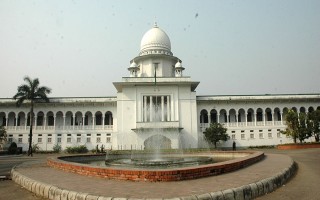SC has no effective control over subordinate judiciary: CJ
Chief Justice SK Sinha said Tuesday said that the Supreme Court has no effective control over the lower judiciary.
He was chairing the 4th day’s hearing on government’s appeal against striking down of the 16th amendment by the High Court Division.
All the seven judges of the Appellate Division took part in the hearing.
The amendment had restored Parliament’s power to remove Supreme Court judges on the grounds of misbehaviour or incapacity.
At the outset of the hearing, the Chief Justice asked the attorney general Mahbubey Alam to say whether the judiciary was functioning when the SC has no effective control over the subordinate judiciary and the vacancy in a district judge’s position cannot be filled for five months.
He also asked the attorney general to say whether it could be said that an effective and functional judiciary exists when a district goes without a district judge and ‘You want to bring the higher judiciary under Parliament’s control.’
In reply, the attorney general submitted that the judiciary would be ineffective only if anarchy prevailed in
the country but that was not the situation now.
He submitted that some of the observations in the High Court Division’s verdict on the 16th amendment were harsh and he prayed that the Appellate Division would drop them.
At this point, Justice Md Abdul Wahhab Miah pointed that verdicts were delivered only to uphold the Constitution.
The Chief Justice said that the verdicts were delivered to uphold the Constitution and keeping human rights and the rule of the law in the perspective.
‘We would definitely consider if there are unacceptable things in the HC judgement’, he assured the attorney general.
He said that as the Chief Justice whatever he says were in the interest of the judiciary.
He said that the law minister loves to say that the judiciary was independent and that the judges’ salaries had been increased.
He wanted to know whether the judiciary becomes independent because of enhancements in judges’ pays.
The attorney general submitted that the 16th amendment was brought in the interest of the country and restore the Constitution to its original shape.
At one stage, the Chief Justice demanded to know why then keep Article 70 in the Constitution.
The attorney general submitted that the provision refers to the history of horse trading that took place in different countries.
The Chief Justice shot back, ‘When you cannot trust them who would give the guarantee that no horse trading would take place with regard to the judges.’
‘Can the MPs work independently?’ asked the Chief Justice.
The attorney general submitted that an HC judge referred to criminal records of MPs, which if found to be incorrect, could be forwarded to the President for his removal.
The Chief Justice shot back whether the President could remove a Judge while no law exists for this.
The attorney general submitted that in the absence of the Supreme Judicial Council and a specific law, the president can remove a judge as the appointing authority.
‘Is it possible to remove a judge when there is no law for such action? How many thousand years back you want to take the country?’ the CJ wanted to know.
‘This is my opinion, my lord,’ submitted the attorney general.
At this point the judges led by the Chief Justice rose for the day.
The hearing resumes today.
- See more at: http://www.newagebd.net/article/16195/sc-has-no-effective-control-over-subordinate-judiciary-cj#sthash.G52ewboh.dpuf











